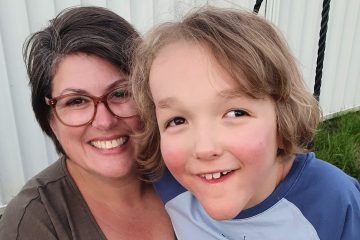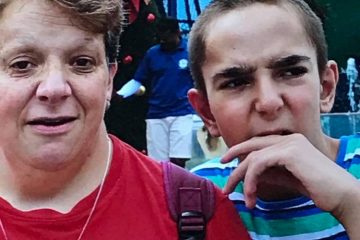When you have a unique child with extra needs, be this medical or developmental support, it can effect the whole family. This includes siblings of whose perspective we don’t often hear about.
Today we ‘Google Met’ with Grace Beswick, who is the sibling of John, who has Sotos Syndrome and she shares her experience growing up and today in this Q+A.
Q: Tell us a bit about John, from your perspective.
Grace: John was and is very into sport growing up. He goes to the gym every day. He’s very driven and likes to keep busy. He enjoys having a lot of hobbies in his Iife and to keep busy but has struggled to make friends. He volunteers at the local radio as a football commentator and has been working now at Woolworths since he was 17. He’s now 32. It is a great job for him and they are very understanding and accommodating. Some of the day-to-day challenges John’s faces include making relationships and connecting with others. He often speaks about feeling lonely and isolated from social interactions and meaningful friendships.
Q: Tell us about how you first became aware that John had Sotos Syndrome
Grace: I’m not sure what age I first knew but I do remember that John was bullied at school due to his differences. In primary school people would make fun of his features and he went to a mainstream primary school. As I got older I noticed his differences more in social settings. I remember at high school he came home with bruises from a bus ride and that was upsetting. I remember my mum and dad discussing it – I think I was around Year 1 or 2.
After that incident, Year 7, John went to a special needs school, where he was happier and made friends there. He has one friend Brett, who he is still friends with. At school he struggled a bit in learning and takes longer to process information.
Growing up – John was just John, my brother and it was society that made me notice his differences because of the way they responded to him, I just accepted him as he was.
Q: What have been the biggest challenges for you as a sibling
Grace: For me, the biggest challenges are when people treat John unfairly. He’s quite quiet and people can treat him rudely and people can quite easily take advantage of him. It has made me more aware of disability at school or work settings. If I see someone who is struggling or perhaps acts different, others may judge but I think hold on – It has given me more empathy and I’ve learnt not to judge others superficially.
Q: Were there challenges with John’s behaviour growing up?
Grace: Growing up he didn’t have any bad tantrums that I was aware. He can get quite overwhelmed by things and cries easily – and when he is down, he gets very down. When he does, I will take him for a walk, which helps. He sometimes needs a push and a helping hand. He struggles sometimes to understand other’s emotions and can come across a bit blunt. I remember for example one birthday him blowing out another child’s birthday candles. The social side of things is very apparent. He’s shy, always has been. Wants to be social and have a girlfriend but struggles with connections. Speaking from my older sister’s perspective, when John was between 3 and 6 years old his behaviour was often challenging and he struggled to socialise appropriately with other kids his age.
Q: Do you have any advice for other siblings?
Grace: Be open minded and understanding. I put myself in John’s shoes a lot. I recommend siblings learn about Sotos Syndrome – I have found this helped me to understand how his brain works and have more empathy. I constantly check in on him and can feel like a second mum sometimes. I do think about what will happen when my parents are no longer here as I live with them now and John. But we try not to think too far in the future and deal with things when they come. My dad helps John with the bills, as paying on time can be something he struggles with, plus cleaning up.
Q: Do you have any advice for parents?
Grace: My mum was always there for us and checking in. I am the youngest, so they were more protective of me which is natural with the youngest. I think it is important to remind siblings of the Sotos traits. If I have gotten frustrated with John in the past, my mum will remind me that’s the Sotos. Having open communication is really important!
Talking from my mum’s perspective, she would suggest constant nurturing and professional help is essential.
Q: Anything else you would like to share with us?
Grace: People don’t know what Sotos Syndrome is so I really want to thank you guys for the Sotos Syndrome Association of Australia and raising awareness and understanding. I hope that the world can be more inclusive of everyone and we live in a diverse society and we should embrace and celebrate this.
It would be great to have a Sotos Syndrome family meet up to connect with other families going through the same challenges.
Thank you Grace, we really appreciate your time, sharing your perspective with us. You are a wonderful sister I can see with a great attitude! No doubt many of us will learn a lot from reading this!
If anyone else would like to be interviewed for our Sotos Syndrome Association Blog or newsletter, please email us at heather@sotos.org.au



0 Comments